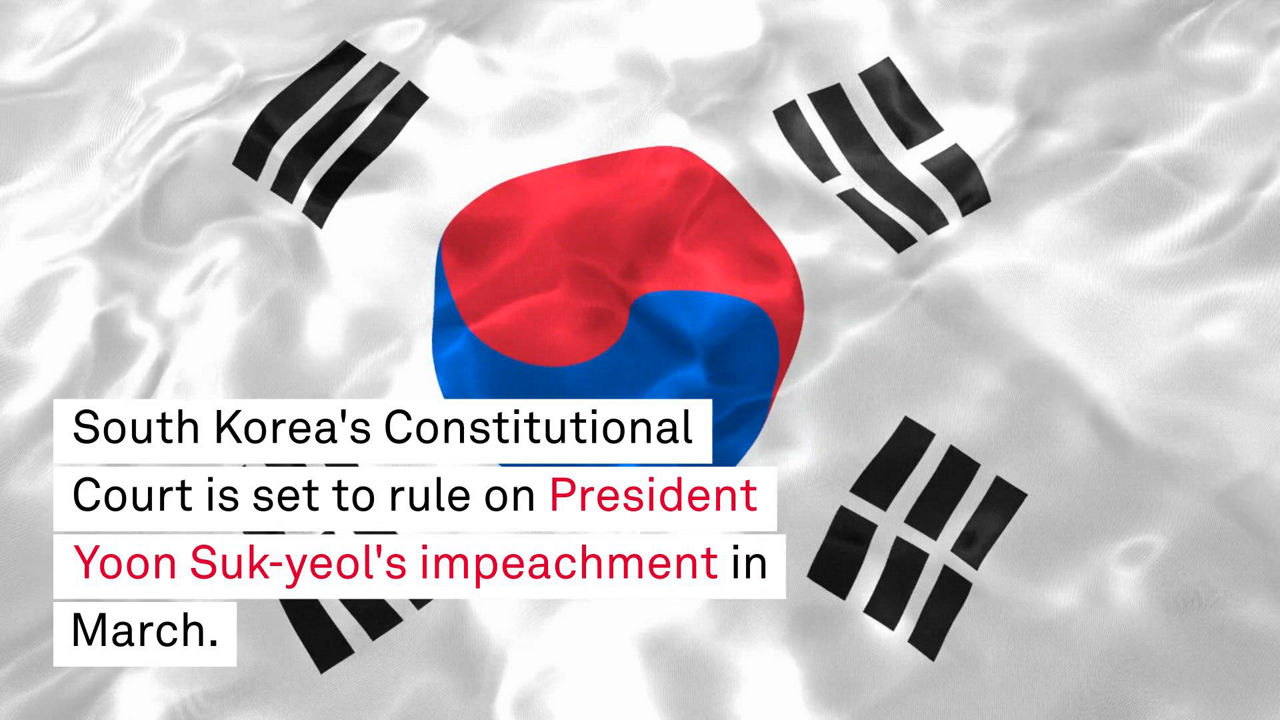Featured Topics
Featured Products
Events
S&P Global Offerings
Featured Topics
Featured Products
Events
S&P Global Offerings
Featured Topics
Featured Products
Events
S&P Global Offerings
Featured Topics
Featured Products
Events
Financial and Market intelligence
Fundamental & Alternative Datasets
Government & Defense
Professional Services
Banking & Capital Markets
Economy & Finance
Energy Transition & Sustainability
Technology & Innovation
Podcasts & Newsletters
Financial and Market intelligence
Fundamental & Alternative Datasets
Government & Defense
Professional Services
Banking & Capital Markets
Economy & Finance
Energy Transition & Sustainability
Technology & Innovation
Podcasts & Newsletters
BLOG — Feb 28, 2025
Our country risk experts provide insight into events that could impact the geopolitical landscape in March.


Our country risk experts provide insight into events that could impact the geopolitical landscape in March.
South Korea’s Constitutional Court is likely to issue a decision on whether to uphold or reject the impeachment of President Yoon Suk-yeol in early to mid-March. In previous impeachment cases, the court has taken 11-14 days to issue a verdict. Until the court makes its ruling, Yoon will remain president, but his duties have been suspended. Six out of the current eight justices on the court will need to vote in favor of impeachment for Yoon to be formally removed from office. Yoon’s lawyers have stated that the president will respect the outcome of the court’s ruling. If Yoon’s impeachment is upheld, he will be formally removed as president, and a new presidential election will be held within 60 days. If the impeachment is overturned, Yoon will be reinstated as president. However, it is unclear whether he would be able to carry out his presidential duties even if his suspension is lifted, as he is currently detained as part of a separate, ongoing criminal trial for charges of insurrection related to his declaration of martial law on Dec 3, 2024. Yoon has denied any wrongdoing. In either scenario, protests are likely in the one-month outlook.
The US and Russia will continue preliminary talks on ending the war in Ukraine. The US and Russia will likely continue refining the specifics of their bilateral arrangements from the first meeting, while the US is likely to pursue a parallel negotiation track with Ukraine to formalize the terms on US access to Ukraine’s natural resources and infrastructure, as well as the framework for future US military aid. The first US-Russia high-level meeting took place on Feb. 18, 2025, in Riyadh, Saudi Arabia. The US and Russia have reportedly achieved more concrete results regarding their bilateral relationships, agreeing to establish a “consultation mechanism” to “normalize” bilateral relationships and to work on “a path to ending the conflict in Ukraine as soon as possible.” With substantive US-Russia negotiations likely to begin within weeks, the intensity of fighting in the east and south of Ukraine and in Russia’s Kursk region is likely to be sustained at least at current levels.
Yamandú Orsi of the left-wing coalition Broad Front will take office on March 1 after winning the presidential election in October 2024. Orsi’s plan does not include structural changes to taxation or labor market arrangements. The main policy difference with outgoing President Luis Lacalle Pou’s administration is that Orsi is likely to seek changes to Lacalle’s 2023 pension reform, including lowering the retirement age and modifying the system currently dominated by private pensions fund Administradoras de Fondos de Ahorro Previsional, or AFAP, but without ending private-sector provision as demanded by unions. If Orsi fails to progress changes to pension regulations, this would be likely to trigger protests and strikes during the first year of the new government’s term by major labor union National Convention of Workers.
The 42-day first phase of the ceasefire between Israel and Hamas that came into effect on Jan. 19 is scheduled to end on March 1. Both sides had been scheduled to begin negotiations on Feb. 3 for the second phase, but talks remained delayed as of late February. Regardless of whether the initial phase of the ceasefire is extended, probably with further violations, the ceasefire process is likely to break down in the 12-month outlook, with a high likelihood of military conflict resuming.
The new Syrian government is likely to be confirmed on March 1. The new government’s composition is unlikely to differ much from the current Military Operations Administration, even with ongoing rounds of dialogue engaging with Syria’s diverse societal groups. A key determinant of the new government’s ability to make progress with reconstruction and infrastructure investment will be the continuation of sanctions waivers by the US and EU. The EU lifted some sanctions on Feb. 24, including on the energy and transport sectors, and some banking restrictions, while the US currently maintains its six-month waiver. Further sanctions relief would enable longer-term reconstruction projects and trade partnerships, most likely with Turkey and Gulf governments. Continued sanctions relief will also probably determine the wider populace’s acceptance of the government. The new government is unlikely to be able to consolidate control over all Syrian territory.
Want to understand the global landscape in 2025? Click here for our special report, Power Plays in 2025
This article was published by S&P Global Market Intelligence and not by S&P Global Ratings, which is a separately managed division of S&P Global.